
Violent anti-Semitic protests rocked several cities in Russia’s North Caucasus in the last days of October. The largest riot was the pogrom at Makhachkala airport on 29 October, when several hundred Dagestanis broke through the runway in search of “refugees from Israel.” Some of the passengers who flew in to Dagestan’s capital from Tel Aviv had to be hidden by the authorities at a nearby military base. “This is not a crowd. It's a herd of deranged animals,” Dagestan's head Sergei Melikov said of the rioters. The damage to the airport was estimated at 285 million roubles (close to $3.05 million). The Insider discovered that local opposition bloggers started spreading rumors about the arrival of immigrants from Israel to the North Caucasus two weeks before the airport riots. Most of these bloggers do not reside in the region, and Russian authorities suspect them of having ties to Hizb ut-Tahrir.
Anti-Semitism on Telegram
Speeches against Jews and Israel in Russian-language Telegram channels and chats appeared immediately after the outbreak of war in the Middle East. Popular Salafi blogger Sultan Abu Amin published a prayer (dua) calling for “the most painful death for the Yahudi.” Judging by the text of the prayer, which was spread by hundreds of Telegram users, Sultan Abu Amin composed it himself. It features the word “yahud” — derived from the Arabic word for “Jew.” The term is not common in Russian and is usually used either in translations of the Koran, as well as hadiths and texts of Islamic preachers (like other Arabic writings that translators merely transliterate), or among nationalists as an insult or slur.
The author is alluding to the mass migration of Jews to Palestine (first as part of the Ottoman Empire, then as part of the British Mandate for Palestine) from the late 19th century. Much of the immigration took place against the backdrop of rising anti-Semitism in Europe. The arrival of Jews caused resentment among the local Arab population. In 1947, the UN General Assembly adopted a resolution to divide the British Mandate for Palestine into two Jewish and Arab states, sparking the start of the first Arab-Israeli war. As a result, Israel's borders became much wider than the UN plan had envisioned. The construction of Jewish settlements on lands that were intended for the creation of an Arab state continues to this day.
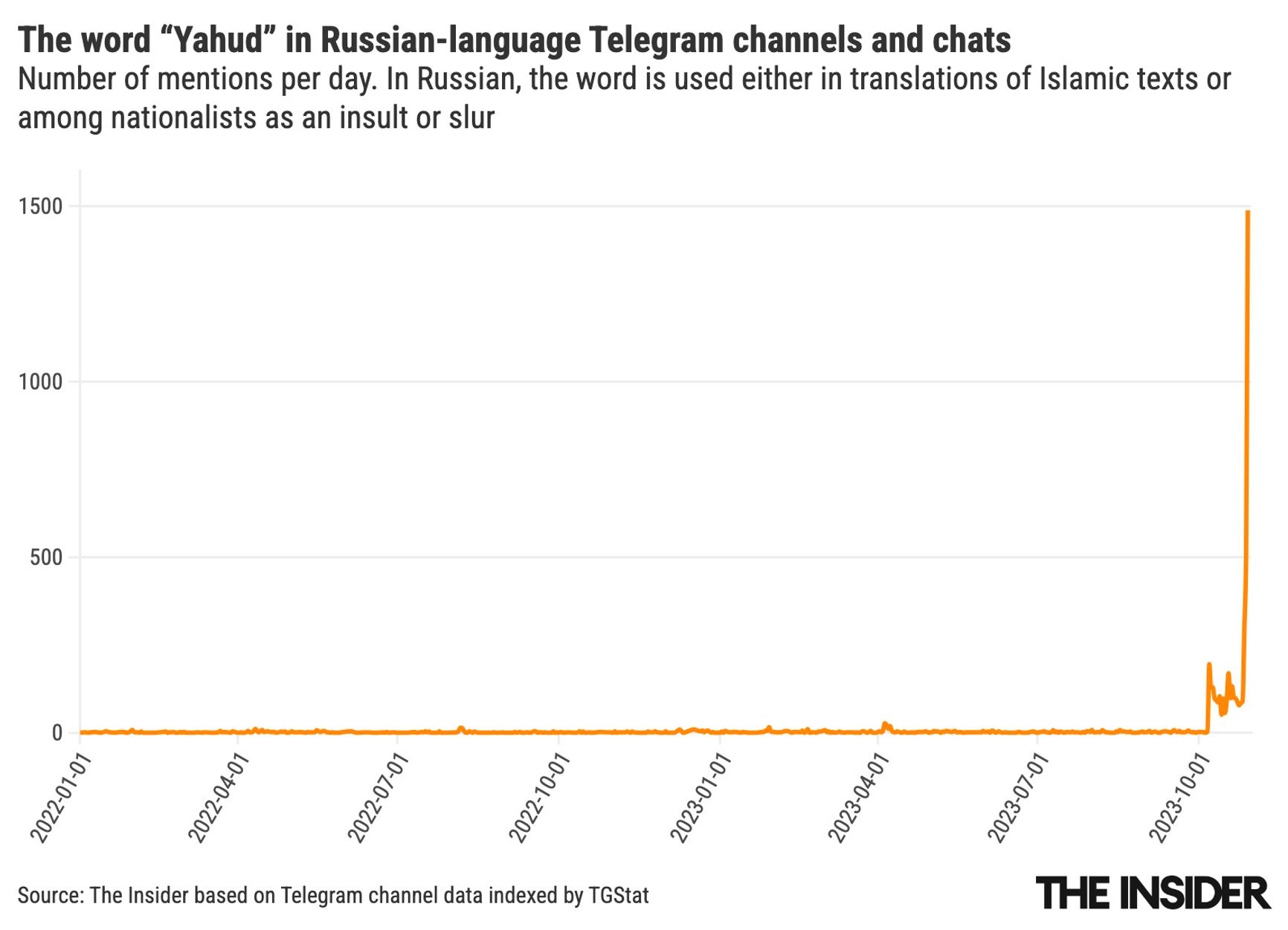
The most messages with calls against Jews were published by the channels Obyedinenniy Kavkaz (United Caucasus), Utro Dagestan (“Morning Dagestan”), D///IHAD, Shamil Siltinsky, Front Islama (“Front of Islam”), Abu_Caucas, Al Istiqam, Batir Karachaevskiy, DOU!, as well as multiple other blogs with Islamist content. Some users supported aggressive statements in the blogs’ chat rooms.
The channel Utro Dagestan called for a rally in support of Palestine on October 13 “in the courtyards of mosques,” and then, together with the channel Gorets, began calling for a rally in Makhachkala on October 17. After the city’s administration warned that the rally was unsanctioned, several dozen people came out to Lenin Square. “The protesters were dispersed as if they had come out against Russia, not against Israel!” — the Gorets channel claimed. According to other witnesses, however, the rally was not broken up and no one was detained — the police spoke to the protesters and asked them to disperse. According to a report by the Novoye Delo newspaper, some of the protesters were issued notices to the local military draft office.
The protest sparked a significant response on opposition blogs, with Utro Dagestan and DOU! taking the lead. They emphasized that Dagestanis should not require permits for organizing rallies, including those in solidarity with Muslims. The authors at Utro Dagestan pointed out that in 2009, even the Muftiate of Dagestan itself organized rallies in support of Gaza. A similar demonstration was held in the city of Khasavyurt on October 20, although it was disbanded, and no arrests were made.
The author is alluding to the mass migration of Jews to Palestine (first as part of the Ottoman Empire, then as part of the British Mandate for Palestine) from the late 19th century. Much of the immigration took place against the backdrop of rising anti-Semitism in Europe. The arrival of Jews caused resentment among the local Arab population. In 1947, the UN General Assembly adopted a resolution to divide the British Mandate for Palestine into two Jewish and Arab states, sparking the start of the first Arab-Israeli war. As a result, Israel's borders became much wider than the UN plan had envisioned. The construction of Jewish settlements on lands that were intended for the creation of an Arab state continues to this day.
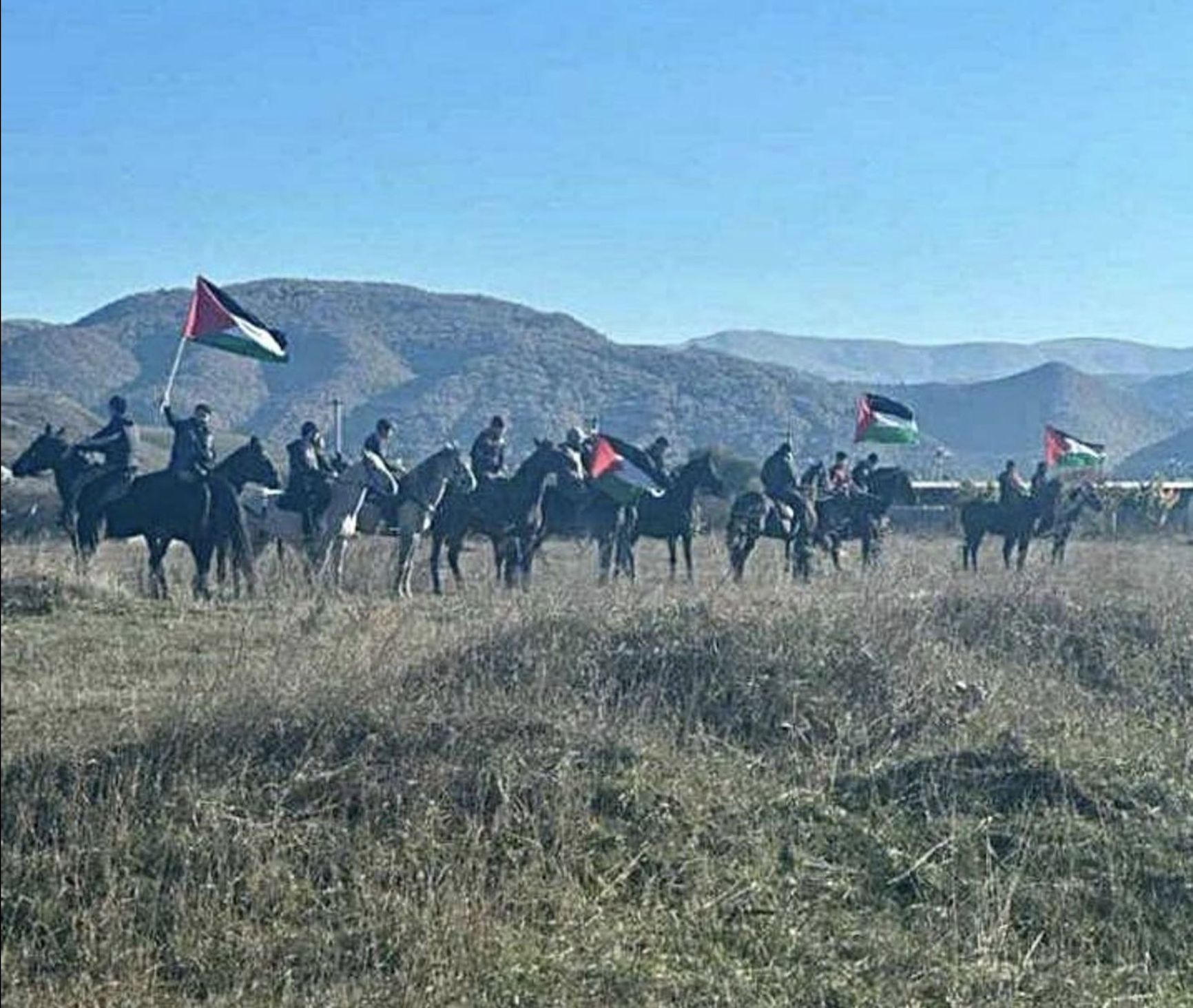
A rally in support of Palestine on horseback, held in Dagestan's Karabudakhkent District
Source: MCHS (“Makhach, Che Stalo?”) Telegram channel
It is worth noting that Dagestan's main Influencers — former MMA fighter Khabib Nurmagomedov and blogger Hasbik (Khasbullah Khusnetsky) — have supported Palestine and published a lot of news from the Gaza Strip with calls to pray for the Palestinians, but did not initially call for aggression against Jews or Israel. MMA fighter Islam Makhachev called for “stopping the war in Palestine” after winning a UFC title bout on October 22. Yet, as news circulated about Israelis arriving in Dagestan, Hasbik, like numerous other bloggers, shared a notice on his channel, urging people not to accommodate Jews.
“The Jews are coming!”: Hysteria takes hold of Telegram feeds
Many international airlines cut back on flights to Israel after Hamas militants attacked settlements in the south of the country on October 7, which led to Israel’s official declaration of war. Israel's national carrier El Al continued to fly to Russia. Of the Russian companies, only Azimut (flying to Sochi and Mineralnye Vody) and Red Wings (flying to Sochi and Moscow) had direct flights. After several days of cancellations and postponements, both airlines resumed regular flights between Israel and Russia.
This allowed the Russian embassy not to organise “evacuation” flights for Russian citizens who wanted to leave, on an official level. “Any Russian citizens who are in Israel today are able to buy a ticket and travel to their homeland,” announced Ambassador Anatoly Viktorov, while admitting that hundreds of Russian citizens had approached the embassy about evacuating the country. Ticket prices ranged from tens to hundreds of thousands of roubles (with 100,000 roubles roughly converting to $1,070), but the flights were close to full capacity.
Red Wings also organised a special “evacuation” flight from Tel Aviv to Moscow with a technical stop in Makhachkala. The first such flight was scheduled October 11. On that day, local Telegram channels began spreading information regarding the arrival of “Israeli refugees” in Dagestan. The first channels to report on the flight were the pro-government channel Chto Tam U Dagestantsev? (“What’s going on in Dagestan?”) and Ekho Dagestan (“Echo Dagestan”), both of which enjoy substantial popularity in the region.
The author is alluding to the mass migration of Jews to Palestine (first as part of the Ottoman Empire, then as part of the British Mandate for Palestine) from the late 19th century. Much of the immigration took place against the backdrop of rising anti-Semitism in Europe. The arrival of Jews caused resentment among the local Arab population. In 1947, the UN General Assembly adopted a resolution to divide the British Mandate for Palestine into two Jewish and Arab states, sparking the start of the first Arab-Israeli war. As a result, Israel's borders became much wider than the UN plan had envisioned. The construction of Jewish settlements on lands that were intended for the creation of an Arab state continues to this day.
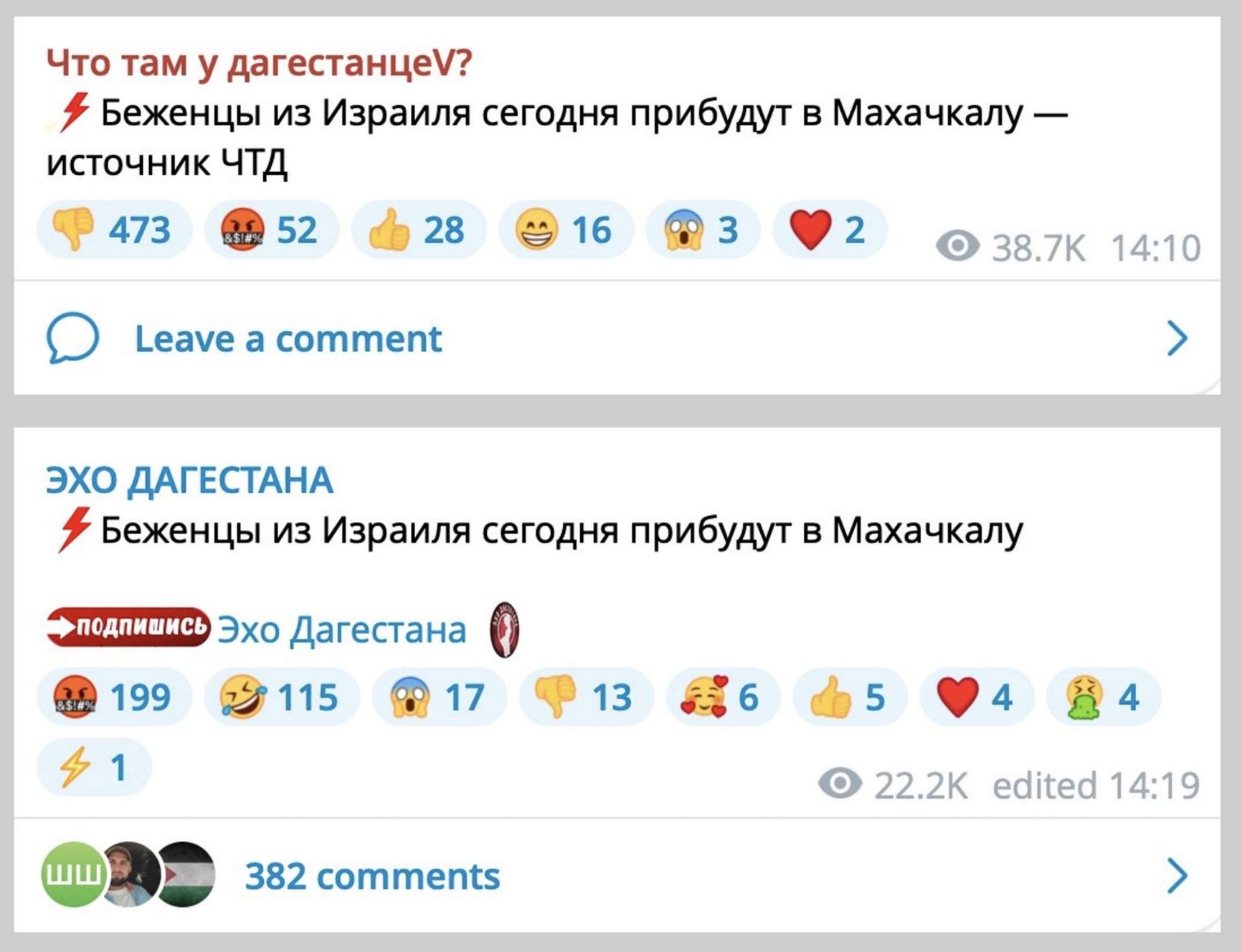
“Refugees from Israel will arrive in Makhachkala today” — screenshots of messages posted on Ekho Dagestan and Chto Tam U Dagestantsev?, October 11
Both channels saw a predominantly negative response from their subscribers. Within the Ekho Dagestan channel's chat, concerns emerged, including worries that the newcomers might encroach on local land or that locals would be more inclined to lease flats to them; the initial indications of threats of violence against the newcomers also appeared. Surprisingly, this unexpected news, initially published in the BRIEF channel (controlled by Russia’s Presidential Administration), was swiftly circulated to hundreds of thousands of subscribers and was even featured in a compilation of the day's most significant stories. Local politician Khadzhimurat Abakarov almost immediately warned that a “provocation” was planned at the airport, adding that “it is not refugees from Israel who are flying here, but our fellow countrymen who were working [in Israel]. [...] And for that matter, even if the passengers on the flight were Jews, they are people indigenous to Dagestan, not guests.”
The message was picked up by the opposition channel Utro Dagestan (deleted at the time of writing, the archive of messages is available to The Insider) and the Salafist Al Istiqam. The latter again hinted that those arriving in the republic would want to evict the locals (the message was deleted on October 30):
“We have already seen a similar situation. First they will arrive as refugees, then they will start drawing their borders, and then they will seize them.”
This message was spread by other Islamic channels, such as Batir Karachaevskiy (this channel was also deleted by Telegram’s administration on October 30). Non-Islamist channels were also outraged. “Will our government really take it like this! Is Makhachkala unlimited or what?” — the channel Netipichnaya Makhachkala (“Atypical Makhachkala”) quoted one of its subscribers as saying. The post provoked roughly the same reactions - fear that housing will become more expensive, the intention to chase away newcomers and aggression towards the passengers on the flight. The Kavkaz Front (“Caucasus Front”) channel spread information that the refugees “will arrive in Derbent, Grozny and Nalchik” and “plan to stay [here] permanently, as mountain Jews have moved from the Caucasus to Israel.” The channel did not specify the source of the information.
The arrival of the plane on October 11 was followed by all local Telegram channels. Ekho Dagestan published the time of arrival and a photograph allegedly taken at Tel Aviv Airport.
The author is alluding to the mass migration of Jews to Palestine (first as part of the Ottoman Empire, then as part of the British Mandate for Palestine) from the late 19th century. Much of the immigration took place against the backdrop of rising anti-Semitism in Europe. The arrival of Jews caused resentment among the local Arab population. In 1947, the UN General Assembly adopted a resolution to divide the British Mandate for Palestine into two Jewish and Arab states, sparking the start of the first Arab-Israeli war. As a result, Israel's borders became much wider than the UN plan had envisioned. The construction of Jewish settlements on lands that were intended for the creation of an Arab state continues to this day.
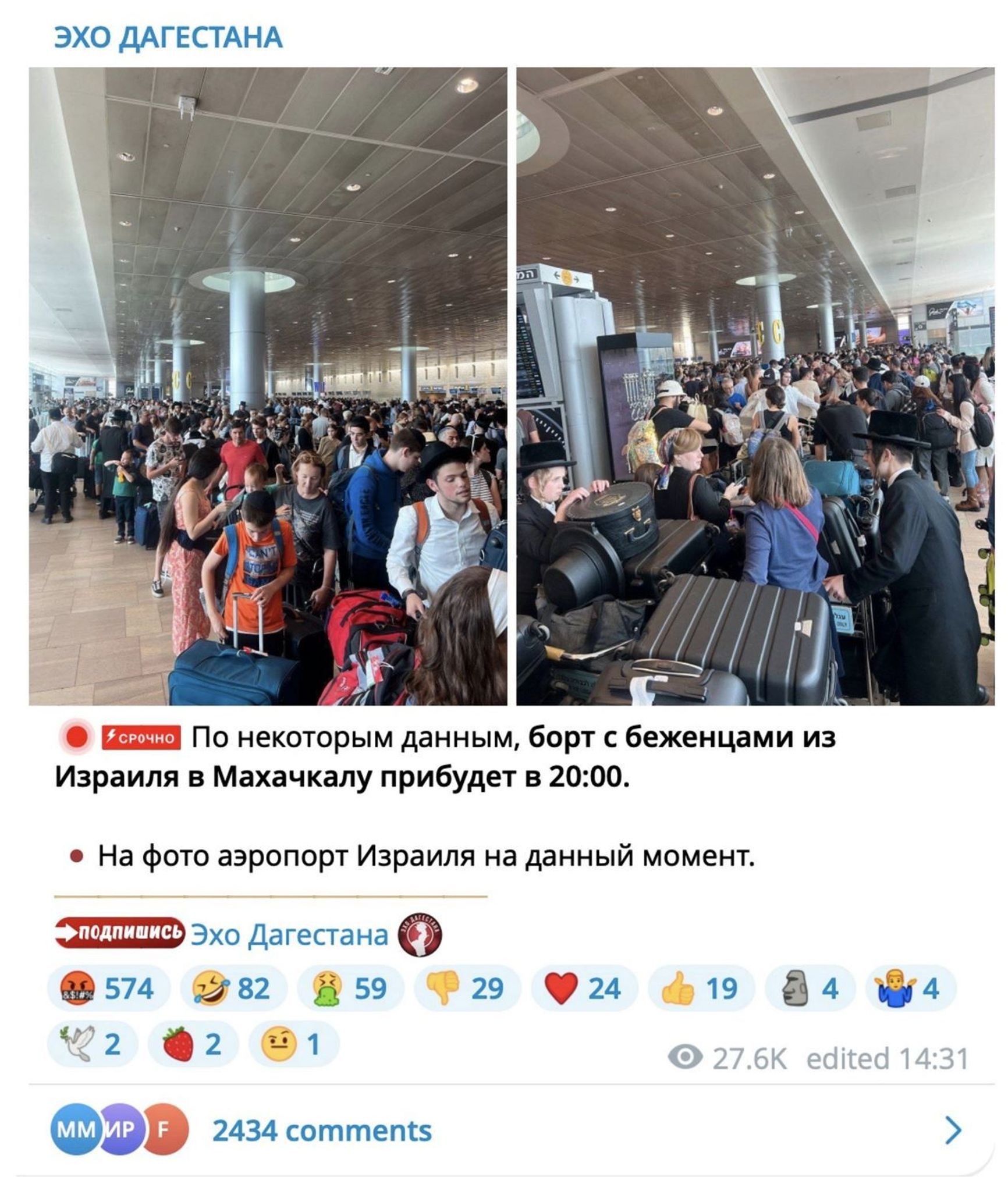
According to some reports, the flight with refugees from Israel will arrive in Makhachkala at 20:00. The photo shows the airport in Israel at the moment.
However, reports about the flight only appeared in the early morning. The channel Utro Dagestan published a photo of men with Palestinian flags standing at the entrance to the new terminal of Makhachkala airport, with the caption:
“A plane from Israel was welcomed at Makhachkala airport! The bitter experience of Palestine, which welcomed refugees with open arms, teaches us to show these passengers their place — right on arrival!”
Kavkaz Front posted a photo with the same message. The channel Sovest Dagestana (“Conscience of Dagestan”) posted the same photo with a different caption: “They say that these are the same scary Israelis who came to conquer Dagestan. Derbent is finished.” The photo was also posted by the DOU! channel, which is run by Ali Charinsky (Arslan Mirzaev) and Hasan Dzhabrailovich (Hasan Gadzhiev) — Dagestanis who have left the republic.
The author is alluding to the mass migration of Jews to Palestine (first as part of the Ottoman Empire, then as part of the British Mandate for Palestine) from the late 19th century. Much of the immigration took place against the backdrop of rising anti-Semitism in Europe. The arrival of Jews caused resentment among the local Arab population. In 1947, the UN General Assembly adopted a resolution to divide the British Mandate for Palestine into two Jewish and Arab states, sparking the start of the first Arab-Israeli war. As a result, Israel's borders became much wider than the UN plan had envisioned. The construction of Jewish settlements on lands that were intended for the creation of an Arab state continues to this day.
![It was embarrassing to write about refugees, but our brothers made the event meaningful. Refugees from Israel were welcomed at Makhachkala airport with Palestinian flags [laughing emoji]](/images/8L58CD-RXdhzLCpptQlNisqTdyAPgb3oAU9JvwdQ4GI/rs:fit:866:0:0:0/dpr:2/q:80/bG9jYWw6L3B1Ymxp/Yy9zdG9yYWdlL2Nv/bnRlbnRfYmxvY2sv/aW1hZ2UvMTk4NDIv/ZmlsZS1iYzE3Y2Uw/ZTkwMzdkYTczYzM1/ZjgzMDEwMWM2YjBl/Ny5qcGVn.jpg)
It was embarrassing to write about refugees, but our brothers made the event meaningful. Refugees from Israel were welcomed at Makhachkala airport with Palestinian flags [laughing emoji]
The Red Wings airline eventually had to issue a statement explaining that it does not transport refugees from Israel to Dagestan. No incidents occurred at the airport that day. The Insider has not been able to establish when the photo in front of the terminal was taken.
Fueling rumors about refugees and a pogrom at the airport
Later, Utro Dagestan began publishing fakes that the republic was going to be populated by Jews. “If somewhere in Makhachkala or Derbent or in any sanatorium you see or hear about the placement of yahuds from Israel, under the guise of ‘refugees’ - report it!!!! We will give them a magnificent reception!!!” — the channel's administrators promised [spelling and punctuation unchanged — The Insider]. They urged not to rent flats or sell food to the newcomers from Israel.
The author is alluding to the mass migration of Jews to Palestine (first as part of the Ottoman Empire, then as part of the British Mandate for Palestine) from the late 19th century. Much of the immigration took place against the backdrop of rising anti-Semitism in Europe. The arrival of Jews caused resentment among the local Arab population. In 1947, the UN General Assembly adopted a resolution to divide the British Mandate for Palestine into two Jewish and Arab states, sparking the start of the first Arab-Israeli war. As a result, Israel's borders became much wider than the UN plan had envisioned. The construction of Jewish settlements on lands that were intended for the creation of an Arab state continues to this day.

Archived copy of a message spreading fakes about “Israeli refugees” on Utro Dagestan, October 23
![“Hi. Do you rent out to Jews? Young family, no kids, elderly mother and father. Able to pay. Good people. Arriving on November 2nd” — “Hello! Yes, we rent out [to Jews]” — An outraged message on the Al Istiqam channel with a screenshot of a conversation on a real estate website](/images/oSsme7hGmotEOLr_t0z5CU95TQP-AO1ebID_HYpti80/rs:fit:866:0:0:0/dpr:2/q:80/bG9jYWw6L3B1Ymxp/Yy9zdG9yYWdlL2Nv/bnRlbnRfYmxvY2sv/aW1hZ2UvMTk4NDQv/ZmlsZS1hYzczZWJj/ZDY3OTRmNWY3Nzlh/YzhjNzgyMTNhZmYz/MC5qcGVn.jpg)
“Hi. Do you rent out to Jews? Young family, no kids, elderly mother and father. Able to pay. Good people. Arriving on November 2nd” — “Hello! Yes, we rent out [to Jews]” — An outraged message on the Al Istiqam channel with a screenshot of a conversation on a real estate website
The topic of refugees allegedly coming from Israel was actively discussed in chat rooms — including those unrelated to the North Caucasus. At the same time, North Caucasian bloggers and the media began to recount recent infrastructure projects by the governments across the region — for example, the construction of a synagogue in Checnya’s capital Grozny or a Jewish centre in Nalchik, the capital of Kabardino-Balkaria.
The author is alluding to the mass migration of Jews to Palestine (first as part of the Ottoman Empire, then as part of the British Mandate for Palestine) from the late 19th century. Much of the immigration took place against the backdrop of rising anti-Semitism in Europe. The arrival of Jews caused resentment among the local Arab population. In 1947, the UN General Assembly adopted a resolution to divide the British Mandate for Palestine into two Jewish and Arab states, sparking the start of the first Arab-Israeli war. As a result, Israel's borders became much wider than the UN plan had envisioned. The construction of Jewish settlements on lands that were intended for the creation of an Arab state continues to this day.
![Such nonsense. Better tell me why the hell Israelis as refugees 300 thousand and every day more and more moved to the Caucasus. Nalchik, Makhachkala, Derbent, Islamic republics? Why don't they go to Vanya [Ivan] in Surgut?](/images/ua0IMedtmV2fG5nRkilzf42dWj8D1wdWUk6x_9hIAQs/rs:fit:866:0:0:0/dpr:2/q:80/bG9jYWw6L3B1Ymxp/Yy9zdG9yYWdlL2Nv/bnRlbnRfYmxvY2sv/aW1hZ2UvMTk4NDUv/ZmlsZS0zMGU2M2Q3/ZmY3ODE2MzMwM2Qy/NDc5NmZkZWMzOWNl/ZC5wbmc.jpg)
Such nonsense. Better tell me why the hell Israelis as refugees 300 thousand and every day more and more moved to the Caucasus. Nalchik, Makhachkala, Derbent, Islamic republics? Why don't they go to Vanya [Ivan] in Surgut?
On October 25, a petition “against Jewish refugees” appeared on the change.org website. Over the next five days, it was signed almost 30,000 times, after which the portal blocked the petition. “The threat to the national security of the multinational people of Russia may lie in the propaganda of the ‘god-chosenness’ of Jews and the inferior origin of all other peoples by radicals. We do not want the expansion of the influence of any radical movements,” the authors of the petition noted.
The channel Utro Dagestan published information about Jewish centres in various cities of the North Caucasus, while other channels called for finding the names and addresses of Jewish community leaders.
Batir Karachaevskiy posted about the construction of a Jewish community center in Nalchik, which led to the creation of a petition against it. The petition gained over 20,000 signatures in four days but was removed due to concerns of racism. Many channels shared posts expressing opposition to the construction — even though the decision to build it had been made a year earlier without causing any controversy.
As a result, a protest against refugees from Israel took place in Cherkessk on October 28th, attended by several hundred people. On October 27th and 28th, several channels, like Abu_Caucas and Batir Karachaevskiy, called for an anti-Jewish demonstration in Nalchik. During this time, rumors spread online about an incident where a group of men reportedly confronted a bus carrying Jews in Nalchik and assaulted them. A video of a mass brawl that had occurred in Tatarstan a week earlier was shared to support these rumors. On October 29, tyres were set on fire at the construction site of the Jewish centre in Nalchik, with the walls of the building vandalized with the words “Death to the yahudim.”
The author is alluding to the mass migration of Jews to Palestine (first as part of the Ottoman Empire, then as part of the British Mandate for Palestine) from the late 19th century. Much of the immigration took place against the backdrop of rising anti-Semitism in Europe. The arrival of Jews caused resentment among the local Arab population. In 1947, the UN General Assembly adopted a resolution to divide the British Mandate for Palestine into two Jewish and Arab states, sparking the start of the first Arab-Israeli war. As a result, Israel's borders became much wider than the UN plan had envisioned. The construction of Jewish settlements on lands that were intended for the creation of an Arab state continues to this day.
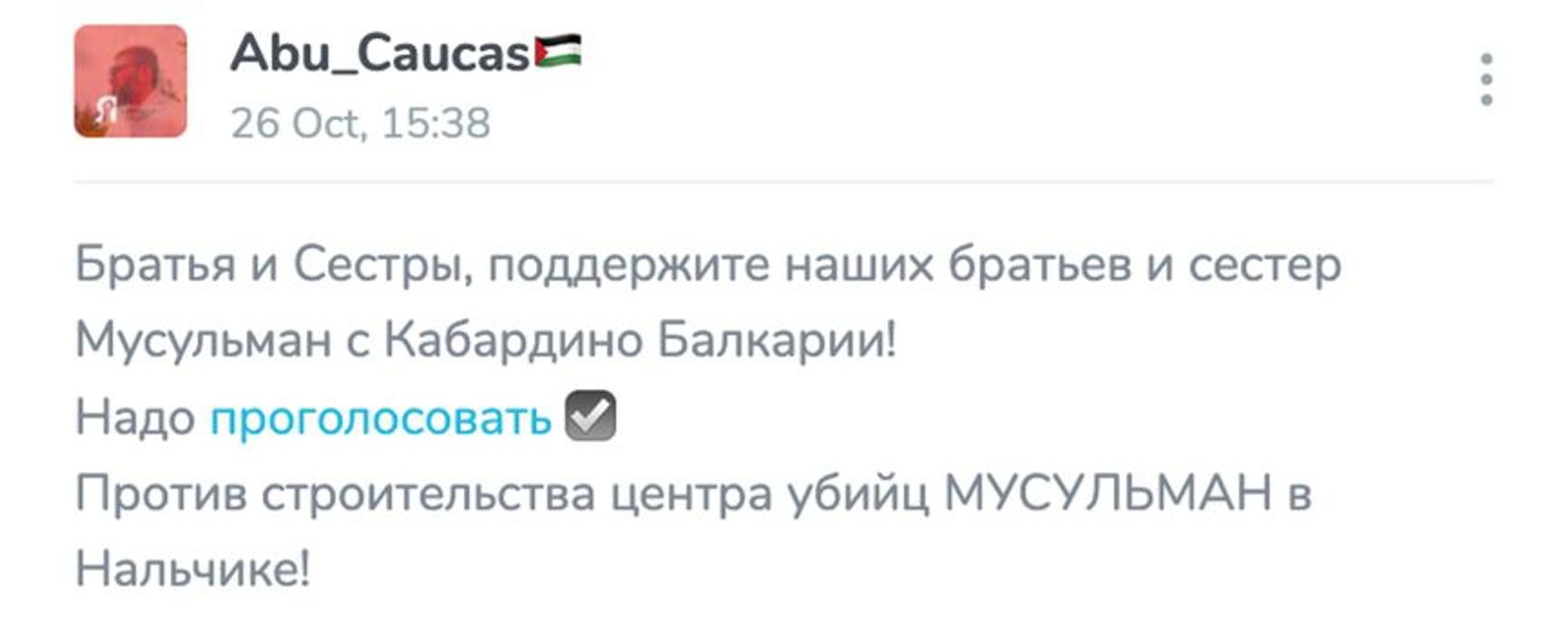
Brothers and sisters, support our Muslim brothers and sisters from Kabardino-Balkaria! You have to vote against the construction of a center for killing MUSLIMS in Nalchik! — Archived copy of a message in the Telegram channel Abu_Caucas, October 26
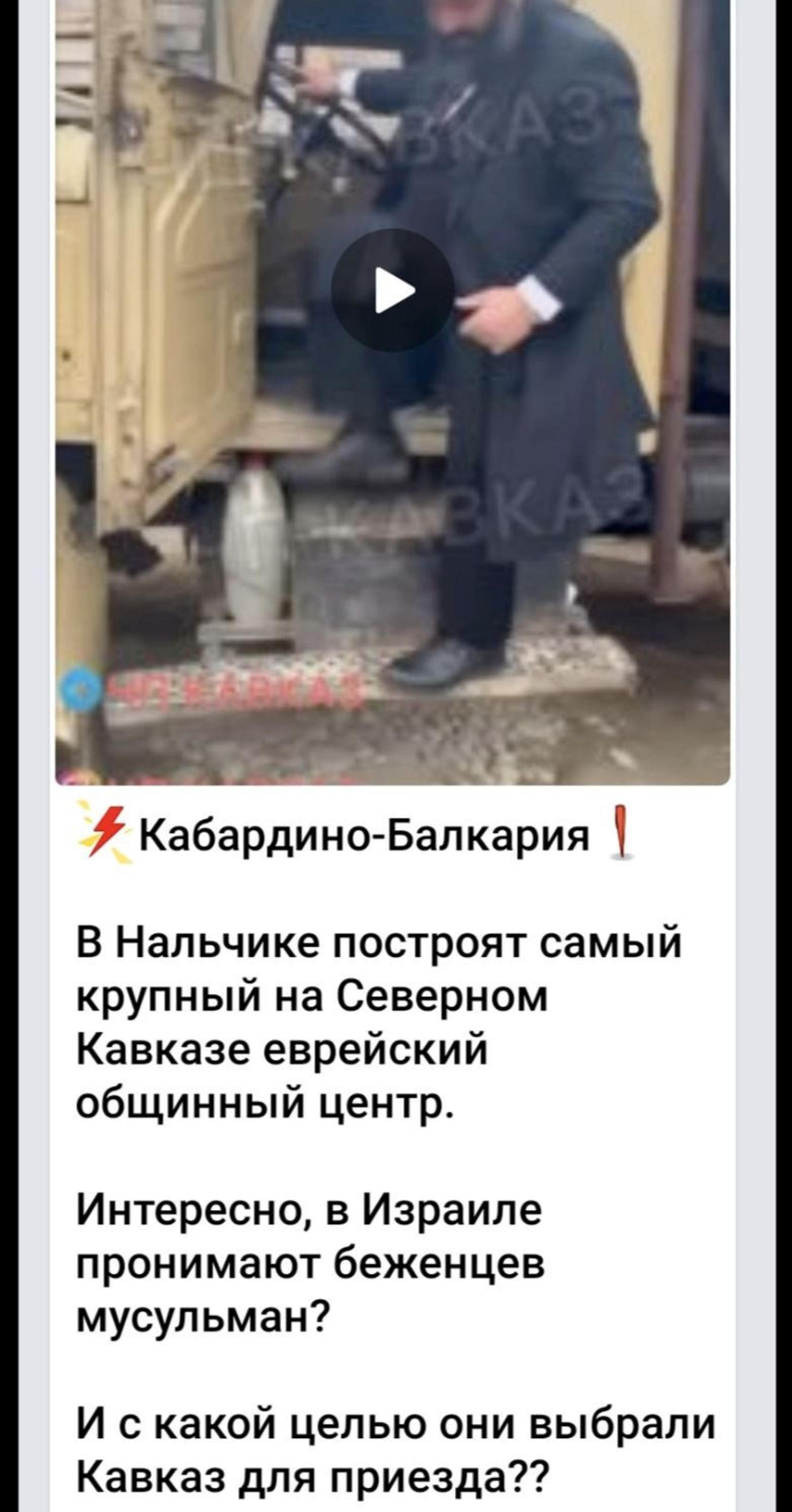
The largest Jewish community center in the North Caucasus will be built in Nalchik. I wonder if Israel accepts Muslim refugees? And for what purpose did they choose the Caucasus to come?? — Screenshot of a message in the Telegram channel ChP Kavkaz, October 26
On October 27, information began to spread in chat rooms that Jews had been placed in hotels in Khasavyurt. The reports were picked up by Utro Dagestan. On the evening of October 28, a crowd of people gathered outside the Flamingo hotel in Khasavyurt demanding that “refugees from Israel” be evicted.
At the same time, the same channels remembered flights from Tel Aviv arriving in Makhachkala. The Salafi channels were the first to spread information about the flights, followed by the opposition channels DOU! and Utro Dagestan.
The author is alluding to the mass migration of Jews to Palestine (first as part of the Ottoman Empire, then as part of the British Mandate for Palestine) from the late 19th century. Much of the immigration took place against the backdrop of rising anti-Semitism in Europe. The arrival of Jews caused resentment among the local Arab population. In 1947, the UN General Assembly adopted a resolution to divide the British Mandate for Palestine into two Jewish and Arab states, sparking the start of the first Arab-Israeli war. As a result, Israel's borders became much wider than the UN plan had envisioned. The construction of Jewish settlements on lands that were intended for the creation of an Arab state continues to this day.
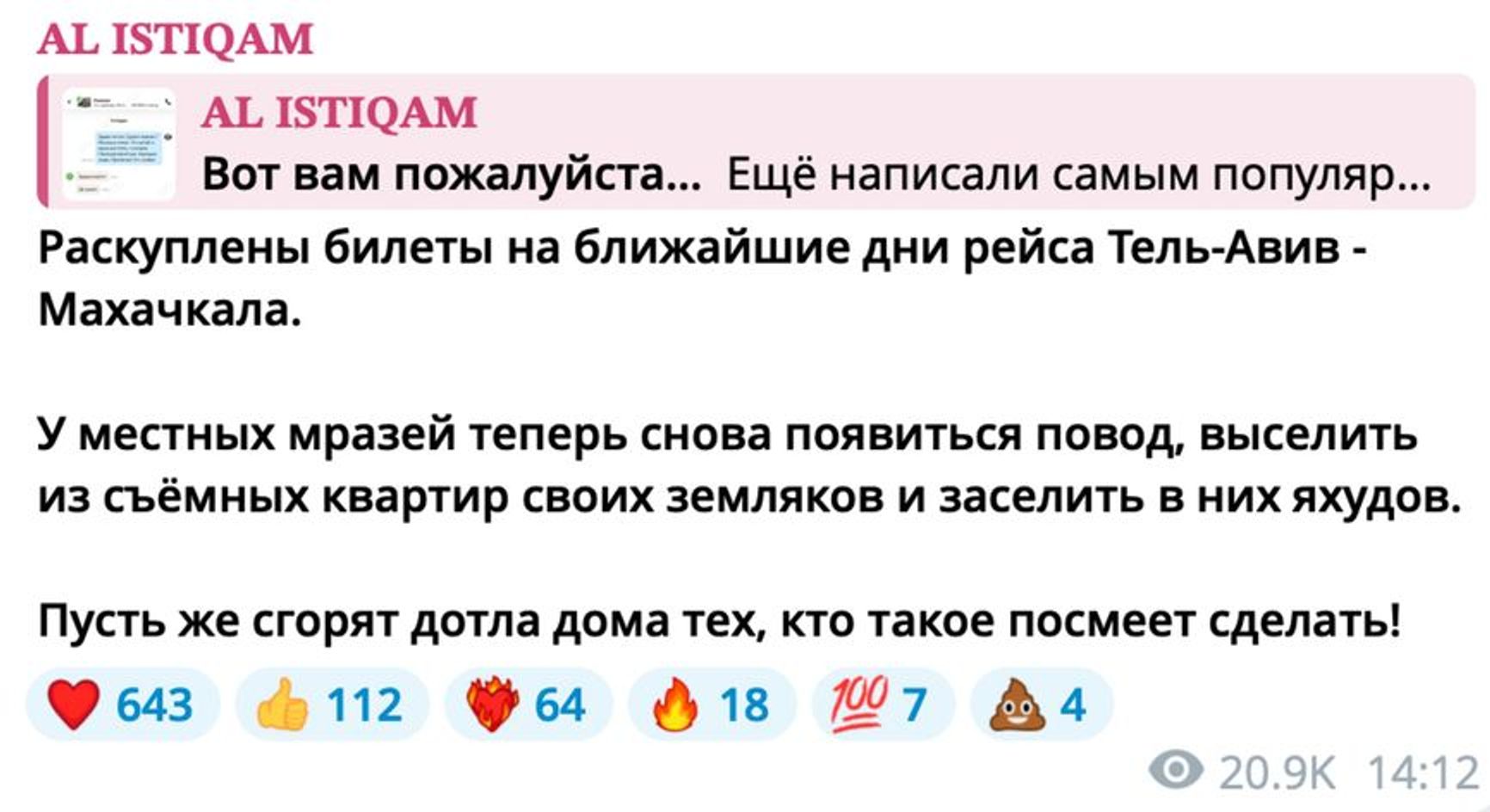
Tickets are sold out for the next few days for the flights from Tel Aviv to Makhachkala. Local scum will now have the opportunity to evict their fellow countrymen from their rented apartments and replace them yahuds. Let the houses of those who dare to do such a thing burn to the ground! — Screenshot of a message in the Al Istiqam Telegram channel, October 28.
The latter called to “greet” the passengers of the flight on October 29. The authors of the channel noted that “it is not necessary to beat the yahuds in the Caucasus,” instead calling for their followers to “boycott their every step and life in Dagestan.”
“Many people ask, what should we do when we meet the yahuds! Or what would happen if yesterday we met yahuds in a hotel, or what should we do when today we meet a direct flight from Tel Aviv? And how do you tell who's a Jew and who's a yahud?! Let's go in order. Our first goal is to point out to both Jews and yahudim that there are no Russian laws on this land,” the authors of the channel wrote.
This led to hundreds of rioters gathering at Makhachkala airport on the evening of October 29, making anti-Semitic statements and attempting to identify Jews on the arriving flights. Opposition and Islamic channels that had previously shared information about Israeli settlers expressed support for the people at the airport and criticized the government's response. “The banner of Jihad has been raised in the Caucasus!” — Abu_Caucas wrote. Batir Karachaevskiy also called for pogroms.
The author is alluding to the mass migration of Jews to Palestine (first as part of the Ottoman Empire, then as part of the British Mandate for Palestine) from the late 19th century. Much of the immigration took place against the backdrop of rising anti-Semitism in Europe. The arrival of Jews caused resentment among the local Arab population. In 1947, the UN General Assembly adopted a resolution to divide the British Mandate for Palestine into two Jewish and Arab states, sparking the start of the first Arab-Israeli war. As a result, Israel's borders became much wider than the UN plan had envisioned. The construction of Jewish settlements on lands that were intended for the creation of an Arab state continues to this day.

Brothers of Kabardino-Balkaria and Karachay-Cherkessia! They say that a plane from Dagestan with Zionists turned into Mineralnye Vody airport! Brothers, get up! From Dagestan they will fly for two hours, from Karachay-Cherkessia and Kabardino-Balkaria you will get to the airport in an hour or an hour and a half! Ingushetia can also make it if they hurry up!
Similar messages were spread in dozens of chat rooms and Telegram channels.
Who is behind the calls for anti-Jewish pogroms?
The head of Dagestan, Sergei Melikov, held “traitors and Banderites” responsible for the riots at Makhachkala airport, while Kremlin spokesman Dmitry Peskov pointed to “external influence,” and many media outlets and channels — including blogger and former presidential candidate Ksenia Sobchak — linked the pogroms to the activities of former MP Ilya Ponomarev. The latter, in turn, denied any connection with the Utro Dagestan channel, which was blamed for the calls for the pogroms.
According to The Insider's sources, Ponomarev had not been involved in the work of the channel since mid-2022. The main owner of the channel was Abakar Abakarov — a Dagestani entrepreneur who left for Ukraine back in 2016. This information was also confirmed by the independent publication Meduza, citing an unnamed source who worked in Ilya Ponomarev's projects. On October 31, Meduza published an article detailing Abakarov involvement in Utro Dagestan.
Dagestan natives Arslan Mirzaev, Hasan Gadzhiev, and Abakar Abakarov, were identified, among others, as the administrators of the Utro Dagestan channel in August 2023. Abakarov moved to Turkey in 2022, while Gadzhiev and Mirzaev now reside in Ukraine. Abakarov co-founded the Congress of Peoples of the Caucasus, while Mirzaev was known as a human rights advocate. Mirzaev and Gadzhiev also manage the DOU! channel. Russia's Ukraine.ru, a propaganda outlet, linked their activities to the Islamic Liberation Party (Hizb ut-Tahrir), which has been designated as a terrorist organization in Russia. It's worth noting that this party isn't classified as a terrorist group in most European countries. Human rights organizations assert that Russian authorities exploit this classification to imprison activists — particularly those advocating for Crimean Tatars’ human rights.
The administrators claim that they left the region due to political reasons. While residing in Dagestan, they were actively involved in advocating for investigations into misconduct by law enforcement.
“In Russia I had a business, a number of charitable projects, I was also involved in politics. Some people close to me, well-known public figures and journalists, were killed by law enforcers, others were jailed for absurd reasons,” Abakarov said in an interview with Radio Liberty affiliate Kavkaz.Realii in 2019. Together with Gadzhiev and Mirzaev, he opened two kindergartens and a school in Ukraine’s Odesa, both of which operated under Sharia law. At the same time, according to Kavkaz.Realii, Abakarov was a property developer in the Moscow Region, but he did not complete the construction of the house without returning people's money.
Arslan Mirzaev (Ali Charinsky) was accused of justifying terrorism after leaving Russia, which was followed by another accusation — of discrediting the Russian army in 2022. He believes that if he had returned to the Caucasus, he would have been killed. In 2015, he did not deny that he was part of Hizb ut-Tahrir.
Hasan Gadzhiev (Hasan Dzhabrailovich) was also a member of Hizb ut-Tahrir — he says this kept him from ending up “in forest dugouts, in sorties with shelling of police checkpoints and the banned Caucasus Emirate.” “They gave me a system of coordinates, told me how to correctly understand Islam, that the non-violent path is the only true way,” he told the publication Slon in 2015. At the time, Hizb ut-Tahrir attempted to organise a large-scale Muslim rally in Moscow against the French magazine Charlie Hebdo, which had published a satirical cartoon of the Prophet Muhammad.
Adam “Abu Kavkaz” Aushev (Abu_Caucas channel), Ayat Abdurakhmanova (MadWorld channel), and Akhmad Israpilov (Al Istiqam) are among the administrators of other channels that called for unrest over the arrival of “refugees from Israel.” Batir Karachaevskiy, Obyedinenniy Kavkaz (United Caucasus) and Front Islama (“Islamic Front”) are anonymous channels that published information about Jews coming to the North Caucasus.
Similar information was also spread by other popular groups in Dagestan: Chto Tam U Dagestantsev? (“What’s going on in Dagestan?”), Ekho Dagestan (“Echo Dagestan”), ChP Kavkaz (“Emergency Caucasus”) and others. The Emergency Caucasus chat room published a lot of information about the arrival and accommodation of Jews, but most of it was usually quickly deleted by moderators.
Akhmad Israpilov (Akhmed Israfilov) also administers the Instagram page Imamat Dagestana («Imamat of Dagestan»). Concerts by popular singer Egor Kreed and the “AniDag” anime festival were cancelled due of his threatening posts in 2019, leading to him receiving a suspended sentence for “public incitement to extremist activities.”
Blogger Adam Aushev (Abu_Caucas) left Russia for Cyprus in 2017. He actively spoke out against the actions of the republic’s government. In 2022, Aushev insulted Ingush elders, after which he was expelled by his teip [a tribal organization or clan, self-identified by descent from a common ancestor or geographic area — The Insider] according to a report by Kavkazsky Uzel (“Caucasian Knot”). He is currently a fugitive, as Russian authorities have launched criminal cases against him on charges related to “public incitement to commit terrorist acts” and the “public justification or promotion of terrorism.”
The author is alluding to the mass migration of Jews to Palestine (first as part of the Ottoman Empire, then as part of the British Mandate for Palestine) from the late 19th century. Much of the immigration took place against the backdrop of rising anti-Semitism in Europe. The arrival of Jews caused resentment among the local Arab population. In 1947, the UN General Assembly adopted a resolution to divide the British Mandate for Palestine into two Jewish and Arab states, sparking the start of the first Arab-Israeli war. As a result, Israel's borders became much wider than the UN plan had envisioned. The construction of Jewish settlements on lands that were intended for the creation of an Arab state continues to this day.